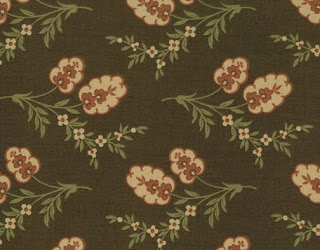Document print for Rose
in my Moda collection Arnold's Attic
Here's a swatch from Arnold's Attic. He cut it from an old skirt that his great-great grandmother Mary Barbara wore in the 1890s when she was about 65 years old. You can barely see a seam on the right side of the swatch, indicating it was cut from a garment.
Arnold noted it was a Balmoral skirt, a style of full skirt fashionable in the 1860s. Mary Barbara probably wore the fashions of her youth late into the 19th century. A black print with a purple figure---conservative in color, yet fashionable in design---would have been appropriate for a lady on the shady side of middle age.
Arnold actually sent two swatches; the one stitched to the note is a fabric scrap leftover from the dress. It's brighter purple than the cotton that survived in the acutal garment, so Mary Barbara's original dress was a touch more flamboyant when she first wore it.
We used neither black nor purple in the Arnold's Attic reproduction collection but the print is perfect for the time period so we offer it in three colorways reflecting the autumn tones. The print name is Rose.
Women about 1880
Women didn't often have their pictures made with their aprons on. The apron fronts are pinned to the dress in typical fashion. One woman wears a stripe; the other a floral with a regular repeat that includes space between the figures and larger figures than would have been popular in the 1860s.
How is Mary Barbara's print perfect for later in the 19th century?
There are a few design characteristics. One is the naturalness of the drawing. Rather than a mere suggestion of a floral as in the reproduction from the mid-19th-century below, the figure in the Rose print is realistic enough that we might recognize it as a wild rose. It's a natural image whereas the figure below is just a suggestion of a floral, what was sometimes called a mignonette (a cute little thing).
Corn Shuck Hat from Civil War Homefront
This print from my Civil War Homefront collection with small floral mignonettes was the fashionable style when Mary Barbara was a young woman in the 1860s. One name for this formal grid style is a foulard print.
Another important style characteristic in fabric is the repeat, how the figure is formatted into identical motifs. All printed yardage requires that the pattern be repeated in regular fashion. The individual figures must fit into an overall pattern, which is sometimes obvious as in the Civil-War-era pattern above with a simple half-drop repeat. Each little figure is dropped next to another half way down. The overall look is a regular diagonal grid, a style of repeat that was hot in the 1860s.
Madonna print in Avon Brown
By the 1890s the fahionable repeat style was what textile designers call scattered. The repeat, like the floral figures, should look more natural than formal. The florals above are repeated in regular fashion, but not so obviously as in the foulard. Tricks to make the repeat look more natural are to add more space between the figures, and to flip and rotate the figures.
Magnolia print in Augusta Red
Joyce sent a photo of a wallhanging she made with the Arnold's Attic prints. Note how the different repeats catch your eye in different fashion. The rather formal leaf print on the outside border contrasts nicely with the loose curve in the patchwork.
Designing a fabric collection means offering several styles of repeat for contrast. Designing a reproduction collection means offering more regular foulards for an 1860s line and more scattered repeats for an 1890s line.
For more on repeat and how designers do it click here to see the Design Sponge blog:
See her blog here:
See more about the Arnold's Attic collection by clicking here:
And check your local quilt shop for Arnold's Attic. Usually, shops have a hard time reordering designer prints but tell your shop owner that Moda has notified me there is lots of Arnold's Attic available for re-order.
Arnold's Attic in a strip quilt by Georgann Eglinski










Tidak ada komentar:
Posting Komentar